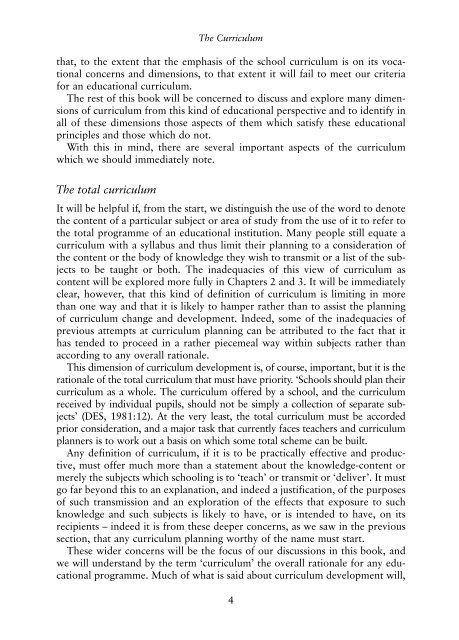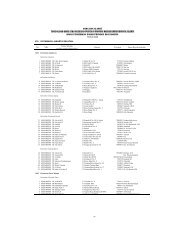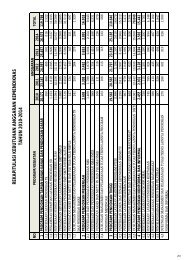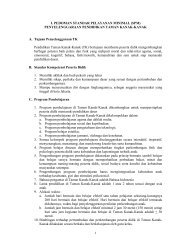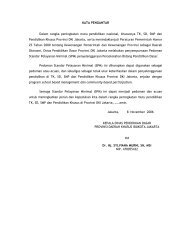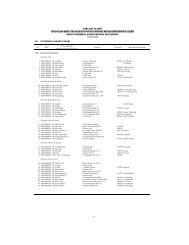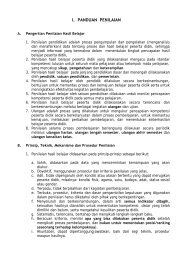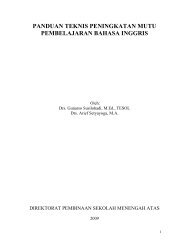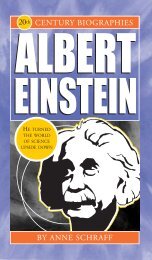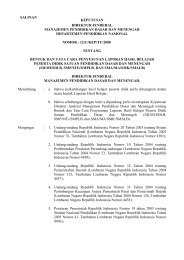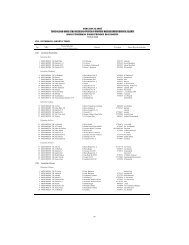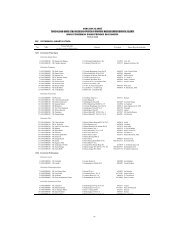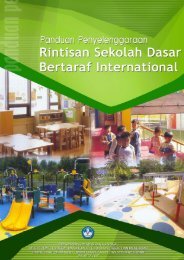- Page 5: A.V. Kelly 2004First published 2004
- Page 11: xThe CurriculumThe initial ambivale
- Page 15 and 16: xivThe Curriculumbackground constra
- Page 17 and 18: xviThe Curriculumshould be avoided
- Page 19: towards central political control o
- Page 23 and 24: The Curriculumsuch as Ivan Illich (
- Page 25 and 26: the planners, the procedures adopte
- Page 27 and 28: The Curriculummoral purpose of the
- Page 29 and 30: The Curriculumwhich have been learn
- Page 31 and 32: The CurriculumWe have long been fam
- Page 33 and 34: The CurriculumIdeologies and curric
- Page 35 and 36: The CurriculumQuite serious and ext
- Page 37 and 38: The Curriculumcance of that asserti
- Page 39 and 40: The Curriculummechanical view is by
- Page 41 and 42: een removed from their sphere of in
- Page 43 and 44: ing the problematic nature of human
- Page 45 and 46: The Curriculumagainst the mysticism
- Page 47 and 48: The Curriculumhave seen is characte
- Page 49 and 50: The Curriculumknowledge rather than
- Page 51 and 52: The Curriculummust be attempted, be
- Page 53 and 54: The Curriculummust be ‘forced to
- Page 55 and 56: The CurriculumAnd it has led some c
- Page 57 and 58: The Curriculumwords, alternative di
- Page 59 and 60: The Curriculumtheir dangers, howeve
- Page 61 and 62: The Curriculumpost-modernism puts o
- Page 63 and 64: 3Curriculum as Content and ProductW
- Page 65 and 66: The Curriculumpresent it. In a cont
- Page 67 and 68: The Curriculumschool and can ultima
- Page 69 and 70: The Curriculumpupils rather than th
- Page 71 and 72:
The CurriculumHowever, it is clear
- Page 73 and 74:
It is because of this fundamental i
- Page 75 and 76:
The Curriculumonly in the United St
- Page 77 and 78:
The Curriculumlum planning is that
- Page 79 and 80:
The Curriculumthe use of this model
- Page 81 and 82:
The CurriculumIt is easy to see why
- Page 83 and 84:
The Curriculumcurriculum planners w
- Page 85 and 86:
The Curriculumfor their own sake, a
- Page 87 and 88:
The CurriculumOne major reason, the
- Page 89 and 90:
The Curriculumbe broken down into
- Page 91 and 92:
objectives, and even, perhaps espec
- Page 93 and 94:
4Curriculum as Process and Developm
- Page 95 and 96:
the basic principles of democratic
- Page 97 and 98:
The first of these, the rejection o
- Page 99 and 100:
The Curriculumprinciples inherent i
- Page 101 and 102:
Education as developmentIt is worth
- Page 103 and 104:
The Curriculumsupports this kind of
- Page 105 and 106:
The Curriculummodel of curriculum r
- Page 107 and 108:
What the developmental model offers
- Page 109 and 110:
The Curriculumwhich we discussed in
- Page 111 and 112:
The CurriculumThere are aspects of
- Page 113 and 114:
God-given status of certain kinds o
- Page 115 and 116:
The Curriculumpractice, it is impor
- Page 117 and 118:
Key issues raised by this chapter1
- Page 119 and 120:
The CurriculumFirst of all we will
- Page 121 and 122:
The Curriculummain significance of
- Page 123 and 124:
The CurriculumTake-Up Project (Scho
- Page 125 and 126:
The Curriculumrelated sources. Firs
- Page 127 and 128:
The Curriculumthat this is not a mo
- Page 129 and 130:
The Curriculumand for providing the
- Page 131 and 132:
The Curriculumopposition and hostil
- Page 133 and 134:
extending and otherwise reordering
- Page 135 and 136:
The Curriculumwhich arose, then, wa
- Page 137 and 138:
The CurriculumThese were among the
- Page 139 and 140:
The Curriculumabout the major chang
- Page 141 and 142:
The CurriculumChapter 8 that a nati
- Page 143 and 144:
6Assessment, Evaluation, Appraisal
- Page 145 and 146:
The Curriculumous assessment forms
- Page 147 and 148:
The CurriculumThe realities of Nati
- Page 149 and 150:
The Curriculumargued (Nuttall, 1989
- Page 151 and 152:
The Curriculumlinked to a curricula
- Page 153 and 154:
Testing and curriculum controlFinal
- Page 155 and 156:
The Curriculumproduces. And so diff
- Page 157 and 158:
The Curriculuming (Stenhouse, 1975)
- Page 159 and 160:
The Curriculumbut which nevertheles
- Page 161 and 162:
The Curriculumuation procedures see
- Page 163 and 164:
The CurriculumThis clearly leads us
- Page 165 and 166:
The Curriculumthe innovation, not m
- Page 167 and 168:
The Curriculuminto play after someo
- Page 169 and 170:
The CurriculumThe intrinsic, democr
- Page 171 and 172:
The Curriculumwe must note here the
- Page 173 and 174:
The Curriculumpolitically grounded
- Page 175 and 176:
The Curriculumprofessional judgemen
- Page 177 and 178:
of educational research, have becom
- Page 179 and 180:
The CurriculumDirect and indirect p
- Page 181 and 182:
that of increased political control
- Page 183 and 184:
The Curriculumof subjects (humaniti
- Page 185 and 186:
The Curriculumintellectual impoveri
- Page 187 and 188:
The CurriculumIn short, one can det
- Page 189 and 190:
The Curriculumclearly defined, ‘t
- Page 191 and 192:
The Curriculumdirected towards what
- Page 193 and 194:
The Curriculumprovision, and the 19
- Page 195 and 196:
The CurriculumImpact on the trainin
- Page 197 and 198:
The Curriculumhalf the members of s
- Page 199 and 200:
The Curriculumtraditonal moral valu
- Page 201 and 202:
context, it is clearly not appropri
- Page 203 and 204:
The Curriculumthe pursuit of profit
- Page 205 and 206:
The Curriculumchanges or can be cha
- Page 207 and 208:
The Curriculumthe what of the curri
- Page 209 and 210:
8A Democratic and Educational Natio
- Page 211 and 212:
The CurriculumKingdom was an except
- Page 213 and 214:
The Curriculumapproach such as this
- Page 215 and 216:
The Curriculumthe inclusion of thos
- Page 217 and 218:
The Curriculumof the piecemeal appr
- Page 219 and 220:
The Curriculumchapters, but the maj
- Page 221 and 222:
of Education, 1931) and reinforced
- Page 223 and 224:
The Curriculumas ‘one of the soci
- Page 225 and 226:
The Curriculumforward the approach
- Page 227 and 228:
The CurriculumAgain, therefore, we
- Page 229 and 230:
The CurriculumThe implications of t
- Page 231 and 232:
The Curriculumbut every attempt mus
- Page 233 and 234:
The Curriculumimplemented in such a
- Page 235 and 236:
The Curriculumcontent but on common
- Page 237 and 238:
The Curriculumtion must be planned
- Page 239 and 240:
A Chronology of Curriculum Developm
- Page 241 and 242:
1965 Circular 10/65 requires all lo
- Page 243 and 244:
BibliographyAlexander, R.J. (1984)
- Page 245 and 246:
The CurriculumPhiladelphia: Open Un
- Page 247 and 248:
The CurriculumFoot, P. (1999) ‘Th
- Page 249 and 250:
The CurriculumJames, C.M. (1968) Yo
- Page 251 and 252:
The Curriculumstudy’. PhD thesis,
- Page 253 and 254:
The CurriculumSimon, B. (1985) Does
- Page 255 and 256:
The CurriculumGoverment reports and
- Page 257 and 258:
Author IndexAdelman, C., 118, 120,
- Page 259 and 260:
The Curriculum165, 167, 171, 175, 1
- Page 261 and 262:
Subject Indexability, 22, 196, 206a
- Page 263 and 264:
The Curriculumconditioning, 47Confe
- Page 265 and 266:
The CurriculumEducation Act (1944),
- Page 267 and 268:
The Curriculum172, 180-181see also
- Page 269 and 270:
The Curriculumpsycho-motor, 57see a
- Page 271 and 272:
The Curriculumscientific approaches


